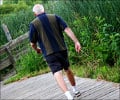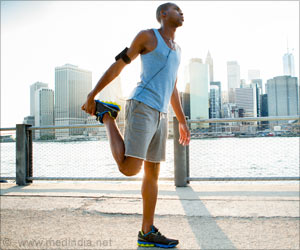Does walking barefoot have health benefits? The body’s broad uptake and use of electrons received from the earth results in various rapid health benefits.
- Walking barefoot on grass, also known as earthing or grounding has gained momentum
- Though people used to walk barefoot in older times, modern lifestyle lacks such contact
- This disconnection could be a major contributor to physiological dysfunction and unwellness
Reduces Pain and Inflammation
Walking barefoot engages your foot muscles in a way that reinforces a natural walking pattern. This natural gait with improved posture, body awareness, and balance can help with pain relief, in part by enhancing the body mechanics of the knees, hips, and core. Moving the way nature intended can lead to stronger leg and core muscles which support and improve lower back strength and tone.Walking barefoot on grass stimulates almost an immediate action to get rid of inflammation. And when inflammation is reduced, oxygenated blood flows more freely and efficiently which makes you heal faster. With improved circulation, the blood carries the health-restorative nutrients to the farthest and minutest corners of the body and promotes faster recovery.
Improves Body’s Sleep Cycle
Recent studies have shown walking barefoot can help stabilize your body clock by improving the consistency of your circadian rhythm and maintaining a healthy sleep-wake cycle. Physical contact with the earth’s surface helps reduces the level of the stress hormone, cortisol, in the body, thereby promoting sound sleep.Aids in Maintaining Posture
Walking barefoot is also a great exercise for the feet as it strengthens and stretches the muscles, tendons, and ligaments in our feet, ankles, and calves. This helps keep the posture upright and maintain good health. It also reduces the risk of developing calluses, strains, and stiffness in the soles of the feet.Regulates Blood Sugar
Walking barefoot continually during rest and physical activity over 72 hours decreased fasting glucose among patients with non-insulin-dependent Diabetes mellitus.Researchers also speculate that earthing the human body influences human physiological processes, including increasing the activity of catabolic processes, and may be the primary factor regulating endocrine and nervous systems.
Boosts Immunity
In an experiment, the effect of walking barefoot (grounding) on the classic immune response following vaccination was examined. Grounding accelerated the immune response, as demonstrated by increases in gamma globulin concentration. This result confirms an association between earthing and the immune response, as suggested in earlier studies.Prevents Heart Disease
Walking barefoot substantially increases the number of negative charges on the surface of an RBC and decreases RBC aggregation, thereby reducing the thickness of blood. The study results strongly suggest that earthing/ grounding is a natural solution for patients with excessive blood viscosity, an option of great interest not just for cardiologists, but also for any physician concerned about the relationship between blood viscosity, clotting, and inflammation.Be Aware of Dangers of Walking Barefoot
Walking barefoot in your house is relatively safe. But when you head outside, you expose yourself to potential risks that could be dangerous. Without appropriate strength in the foot, you are at risk of having poor mechanics of walking, thereby increasing your risk for injury.This is especially important to consider when you’re beginning to incorporate barefoot walking after having spent much of your life in shoes. You should also take the chance of exposing your feet to harmful bacteria or infections when you walk barefoot, especially outside.
Walking barefoot has some benefits, as long as you follow the safety precautions and participate in moderation. If you have any concerns about your safety or foot health, it’s a good idea to talk with your doctor before exposing your bare feet to nature for an extended period.
References:
- Hollander, Karsten, Christoph Heidt, Babette C. Van der Zwaard, Klaus-Michael Braumann, and Astrid Zech. Long-term effects of habitual barefoot running and walking: a systematic review.Med Sci Sports Exerc. 2017.(https://www.researchgate.net/profile/Karsten-Hollander/publication/309617514_Long-Term_Effects_of_Habitual_Barefoot_Running_and_Walking_A_Systematic_Review/links/5a1586240f7e9bc6481b26ef/Long-Term-Effects-of-Habitual-Barefoot-Running-and-Walking-A-Systematic-Review.pdf)
- Gaétan Chevalier, Stephen T. Sinatra, James L. Oschman, Karol Sokal, Pawel Sokal. Earthing: Health Implications of Reconnecting the Human Body to the Earth's Surface Electrons. Journal of Environmental and Public Health 2012.(https://doi.org/10.1155/2012/291541)
- Mathieson, Stephanie, and Chung-Wei Christine Lin. Health benefits of Nordic walking; a systematic review. British Journal of Sports Medicine 2014.(https://bjsm.bmj.com/content/48/21/1577.short)
Source-Medindia
















